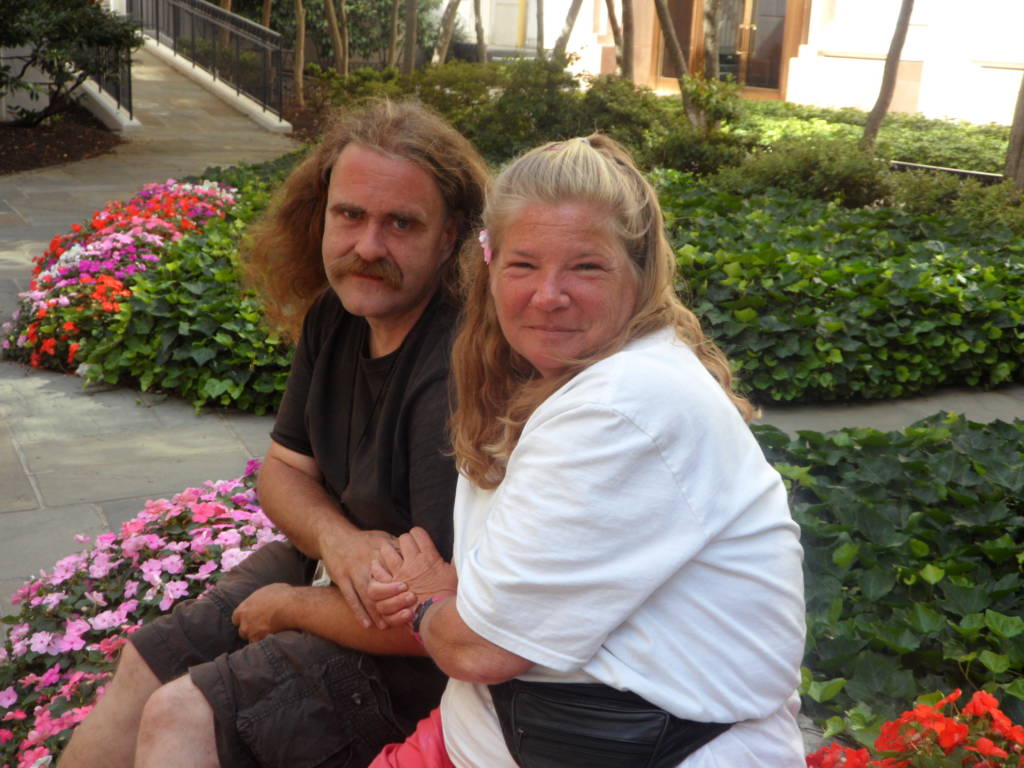After high school in Philadelphia, Tammy Karuza married her sweetheart and became an army wife, traveling around the world and making friends everywhere. Her marriage lasted 20 years. She left it because she felt psychologically abused. “It’s kind of hard to heal from abuse when you’re still being abused by someone else,” she said.
The Occupy movement brought Karuza to Washington. She had been with the encampment in Philadelphia; when that group disbanded she decided to join the occupation in the nation’s capital.
For Karuza, recovering from the past meant staying away from her family and ex-husband, her two main support systems. She had to be on her own and has been sleeping on street corners and in parks for nine months.
She encountered John “Mick” Matthews after settling in with the Occupy protesters in D.C.
“I saw his eyes and I became interested,” Karuza said.
“She came up to me and bummed a cigarette,” Matthews said. “About ten minutes later she came back and bummed another.”
It was an excuse to talk to him. They eventually started dating.
Matthews was born and raised in Southwest D.C. His grandmother, the largest influence in his life, set a plan for him and wouldn’t let him stray from it. After her death, he floated aimlessly.
“I had no clue what I wanted to do with my life after I had a chance to do it,” he said.
After various jobs and half of a history, Matthews moved to Baton Rouge, La. He thought he could secure an apartment there but ran out of money and ended up on the streets. According to him, being homeless in Louisiana is even harder than in the district.
“They don’t have a lot of the amenities there that they have here,” Matthews said. He described shelters where you pay to stay or where they force you to work, which seemed to be the only options other than sleeping on the streets.
Matthews eventually was able to get a few jobs and came back to D.C. to help his mother.
In 2001, a string of tornadoes hit western Maryland. Matthews worked a siding company contracted to put siding on homes that were affected. He said the company had trouble getting paid. They went out of business and Matthews’ job disappeared.
He was back on the street, this time for five years. He knew that his old friends might try to help him despite their own troubles. To protect his friends from potential financial burden, he kept them in the dark.
Matthews became great friends with some of the people he met on the street. One of those friends convinced him to give up panhandling to be a vendor for Street Sense.
Karuza began on different terms. She was always a writer at heart. As a child, she hid her poems from her father for fear that he would take them away. While married, someone offered to help her get a start in journalism, but she was inhibited by a memory of her parents saying her writing would never amount to anything. She had a breakdown and didn’t write for almost 20 years.
Karuza got back into writing almost as soon as she started selling Street Sense. “When I wasn’t selling the paper, I was writing for it,” she said.
Now she uses her writing to sell more papers. It has always been a dream of hers to make a living writing, so she sees this experience as a confidence booster and stepping stone. If everything goes as planned, Karuza will one day be able to call herself a Pulitzer Prize winner.
“I was meant to be a writer,” she said. Her ambition fuels Matthews’ writing goals. He starting to write because of his love of both the written word and Karuza’s passion for it.
“She sparked the fire,” Matthews said about his reentry into the art of pen and paper. “I’m probably going to be writing forever.”




